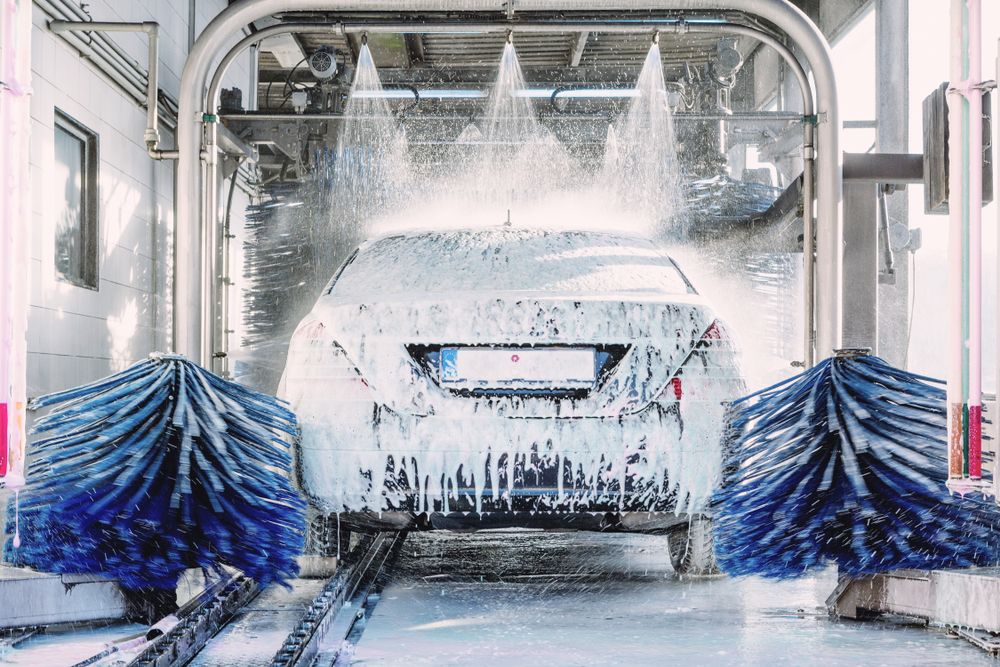This article originally appeared in the October 2021 issue of Professional Carwashing & Detailing magazine.

According to the AAA Foundation for Traffic Safety, Americans travel more than 220 miles in their cars each week.1 Over time, traveling to and from these destinations soils car exteriors. Nearly every car owner would agree that having a freshly washed car puts a smile on his or her face. Many drivers opt for a professional setup to wash their cars at a self service operation or an in-bay automatic carwash.
A critical component resides behind the walls of a carwash that can make or break the customer experience and a business’ bottom line: chemical dispensers. Restoring cleanliness requires the right chemicals and equipment, so the types of dispensers used for these applications are crucial. To ensure a customer drives away with a sparkling clean car, there are some considerations every carwash owner should consider when it comes to installing dispensing systems.
Super concentrates drive super savings
In the last decade and increasingly so over the last several years, many carwash chemical providers have made the switch to ultra-concentrate chemicals, also referred to as hyper- or super-concentrates. Ultra-concentrates have dilutions down to as low as 3000:1. Unfortunately, while these chemicals offer many advantages, much of the current low-pressure venturi float valve equipment on the market struggles to reach that dilution level.
So, why are ultra concentrates the preferred solution? First, chemical companies frequently look for new ways to reduce the environmental impact and the costs of their shipping processes. Including less water with their chemicals results in savings for chemical providers and customers.
Plus, ultra-concentrate containers are more lightweight and compact, making them much easier to transport and store at carwash locations. Reducing the risk of workplace injuries and saving vital space in storage rooms is key. Some ultra-concentrate packaging also ensures all of the product is dispensed, which reduces waste and costs.
The ultra-concentrate approach is well-suited for a wide variety of chemicals — and thus numerous carwash applications. The wash cycle relies on chemicals that are acidic (low pH), neutral and alkaline (high pH). These include such solutions as sealer, protectant, drying agent, detergent, conditioner and more. Because ultra-concentrate chemicals require different dilution ratios depending on their job functions, having the right equipment in place to manage these variations is crucial.
Revving up with the right dispensers
Stakeholders in the carwash industry benefit when dispensers are reliable and accurate. System manufacturers, chemical companies and operators should confirm the following when recommending and installing dispensers.
Dilution capabilities
To achieve the highest-quality clean, dispensers need to be incredibly precise. Look for equipment that has dilution capability down to 3000:1. Many float valves on the market today cannot get that lean. However, there are precise solutions available, and these are preferred when dealing with ultra-concentrate chemicals.
Clogged tips are a frequent annoyance for many carwash operators, especially when using tips with small diameters for leaner dilutions. Technologies exist on the market that eliminate this issue entirely, because they are used in place of eductor tips. The design allows foreign debris to pass through more easily due to the fact that its technology features larger through-hole diameters. Clogged tips typically go undetected for extended periods of time unless carwash operators regularly check their chemical dilutions. Underperformance means that less chemical is delivered to cars, resulting in a subpar wash and increased costs due to rewash.
Ideally, dispensers should also have built-in technology to decrease the risk of poor dilution accuracy when fluctuations in inlet water pressure occur. These sudden changes in water pressure often cannot be avoided. However, equipment that responds well in these cases keeps chemicals flowing as they should.
Chemical compatibility
Today’s equipment needs to be able to withstand the use of many different types of chemicals. These chemicals range from low to high pH and are used in a variety of applications. It’s important to check whether the equipment has been tested with ultra-concentrate chemicals and can be paired with these over the long term. A dispenser with greater chemical resistance will have a longer lifespan and can reduce the overall cost of doing business.
Easy maintenance
Maintenance means fewer cars through the carwash and pulls employees away from their primary duties, thereby negatively impacting profits. Unfortunately, many dispensers on the market require frequent maintenance to keep them operating properly, which drives up the cost of equipment over its lifetime. Opting for an easy-to-maintain system minimizes downtime.
As previously noted, eliminating the risk of clogged tips is one way to reduce maintenance. While a tip can be replaced without having to shut down the entire carwash, the equipment with the clogged tip does need to be idled for the time it takes to replace the tip. It also requires the right expertise to perform the tip replacement.
Check with the manufacturer to confirm how many chemical dilution cycles the equipment can complete before requiring repair or replacement with new components. Lab testing as well as extensive, successful field use can demonstrate the anticipated lifespan of a dispenser.
E-gap design
The benefit of this particular design feature is that a separate siphon breaker is not needed. This greatly reduces the acquisition cost of the equipment.
Clean cars, happy customers
Whether drivers are using a self-serve carwash or relying on an in-bay automatic, they expect their cars to be clean at the end of the process. Clean cars uphold customer satisfaction and drive repeat business for carwash operations. One way to enhance the quality of clean is through the use of dispensers that can reach lean dilutions, are compatible with ultra-concentrate chemicals and offer minimal downtime. By prioritizing reliability and accuracy when selecting new equipment, carwashes can better compete in an increasingly crowded market.